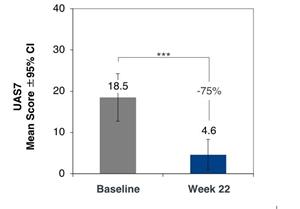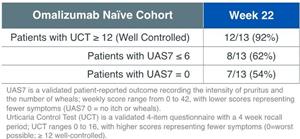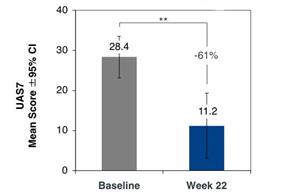-
Allakos Announces Initiation of Phase 2b Clinical Trial of Subcutaneous Lirentelimab in Chronic Spontaneous Urticaria (CSU)
Source: Nasdaq GlobeNewswire / 12 Sep 2022 04:02:00 America/Los_Angeles
SAN CARLOS, Calif., Sept. 12, 2022 (GLOBE NEWSWIRE) -- Allakos Inc. (Nasdaq: ALLK), a biotechnology company developing lirentelimab (AK002) and AK006 for the treatment of allergic and inflammatory diseases, today announced it has initiated a Phase 2b clinical trial to evaluate the efficacy, safety and tolerability of subcutaneous lirentelimab in patients with chronic spontaneous urticaria (MAVERICK). Top-line results from the trial are expected in the second half of 2023.
The Phase 2b CSU clinical trial follows positive results from an open-label Phase 2a clinical trial with intravenous lirentelimab in patients with chronic urticaria, including cohorts of patients with omalizumab naïve CSU and omalizumab refractory CSU (link). Patients in the omalizumab naïve cohort had urticaria symptoms despite treatment with antihistamines (up to 4x labeled dose) and had not been previously treated with omalizumab. Omalizumab naïve patients receiving monthly lirentelimab for 6 doses reported a 75% improvement in the 7 day urticaria activity score (UAS7) with 92% of patients achieving a urticaria control test (UCT) score ≥ 12.
Figure 1: Change from baseline in UAS7 in omalizumab naïve cohort (n=13)
Figure 2: UCT and UAS7 response in omalizumab naïve cohort (n=13)
Patients in the omalizumab refractory cohort had urticaria symptoms despite treatment with antihistamines (up to 4x labeled dose) and treatment with up to 600 mg (2x highest labeled dose) omalizumab for an average duration of 10 months. Omalizumab refractory patients receiving monthly lirentelimab for 6 doses reported a 61% improvement in UAS7 with 57% of patients achieving a UCT score ≥ 12.
Figure 3: Change from baseline in UAS7 in omalizumab refractory cohort (n=7)
The safety results of the trial were generally consistent with previously reported intravenous lirentelimab clinical trials. The most common adverse event was mild to moderate infusion-related reactions (such as flushing, feeling of warmth, headache, nausea, and dizziness) which occurred mostly during the first infusion. Full results of the trial were published in The Journal of Allergy and Clinical Immunology.1
Phase 2b Chronic Spontaneous Urticaria Trial Design (MAVERICK)
The Phase 2b clinical trial is a 12-week, multicentered, randomized, double-blind, placebo-controlled trial that will enroll approximately 110 adult patients with antihistamine refractory chronic spontaneous urticaria (including patients with prior biologics treatment). Patients will be randomized 1:1 to receive doses of subcutaneous lirentelimab 300mg or placebo once every two weeks (Q2W). The primary end point of the trial is the change from baseline in UAS7 at 12 weeks.About Chronic Spontaneous Urticaria (CSU)
CSU is a complex, chronic inflammatory disease considered to be primarily driven by mast cells. However, recent evidence suggests that eosinophils may also have a role in symptomology. CSU is an often-debilitating skin condition characterized by frequent and unpredictable eruption of hives, severe itching and swelling. The disease affects up to 3.5 million patients in the U.S., of which half are refractory to standard-of-care antihistamines.2Allakos Development Programs
Allakos is conducting a Phase 2 randomized, double-blind, placebo-controlled trial of subcutaneous lirentelimab in patients with moderate-to-severe atopic dermatitis and a Phase 2b randomized, double-blind, placebo-controlled trial of subcutaneous lirentelimab in patients with chronic spontaneous urticaria. The Company anticipates reporting topline data from these trials in the second half of 2023. Additionally, Allakos is advancing AK006, an anti-Siglec-6 antibody that selectively inhibits mast cells, including KIT-mediated signaling, into IND enabling studies and plans to initiate a Phase 1 clinical trial in healthy volunteers in the first half of 2023.About Allakos
Allakos is a clinical stage biotechnology company developing therapeutics which target immunomodulatory receptors present on immune effector cells involved in allergy, inflammatory and proliferative diseases. Activating these immunomodulatory receptors allows for the direct targeting of cells involved in disease pathogenesis and, in the setting of allergy and inflammation, has the potential to result in broad inhibition of inflammatory cells. The Company’s most advanced antibodies are lirentelimab (AK002) and AK006. Lirentelimab selectively targets both mast cells and eosinophils, two types of white blood cells that are widely distributed in the body and play a central role in the inflammatory response. Inappropriately activated mast cells and eosinophils have been identified as key drivers in a number of severe diseases affecting the gastrointestinal tract, eyes, skin, lungs and other organs. Allakos is developing lirentelimab for the treatment of atopic dermatitis, chronic spontaneous urticaria and potentially additional indications. Lirentelimab has received orphan drug designations for eosinophilic gastritis (EG), eosinophilic duodenitis (EoD), and eosinophilic esophagitis (EoE) from the U.S. Food and Drug Administration. AK006 targets Siglec-6, an inhibitory receptor expressed selectively on mast cells. In pre-clinical research, AK006 appears to provide deeper mast cell inhibition than lirentelimab and, in addition to its inhibitory activity, reduce mast cell numbers. Allakos plans to begin human clinical trials with AK006 in the first half of 2023. For more information, please visit the Company's website at www.allakos.com.Forward-Looking Statements
This press release contains forward-looking statements within the meaning of the Private Securities Litigation Reform Act of 1995 as contained in Section 27A of the Securities Act of 1933, as amended, and Section 21E of the Securities Exchange Act of 1934, as amended. Such forward-looking statements include, but are not limited to, Allakos’ progress, business plans and areas of focus, the expected timing of reporting topline data from its Phase 2 and 2b clinical trials of lirentelimab, the advancement of IND enabling studies for AK006 and initiation of a Phase 1 clinical trial with AK006. Such statements are subject to numerous important factors, risks and uncertainties that may cause actual events or results to differ materially from current expectations and beliefs, including but not limited to: Allakos’ stages of clinical drug development; Allakos’ ability to timely initiate clinical trials for AK006; Allakos’ ability to obtain required regulatory approvals for its clinical trials; uncertainties related to the enrollment of patients in its clinical trials; Allakos’ ability to demonstrate sufficient safety and efficacy of its product candidates in its clinical trials; uncertainties related to the success of later-stage clinical trials, regardless of the outcomes of preclinical testing and early-stage trials; Allakos’ ability to obtain regulatory approvals to market its product candidates; market acceptance of Allakos’ product candidates; uncertainties related to the projections of the size of patient populations suffering from the diseases Allakos is targeting; Allakos’ ability to advance additional product candidates beyond lirentelimab; Allakos’ ability to obtain additional capital to finance its operations; general economic and market conditions; and other risks. Information regarding the foregoing and additional risks may be found in the section entitled “Risk Factors” set forth in Allakos’ most recent Annual Report on Form 10-K filed with the SEC on March 1, 2022, Allakos’ Quarterly Report on Form 10-Q filed with the SEC on August 4, 2022, and future reports to be filed with the SEC. These documents contain and identify important factors that could cause the actual results for Allakos to differ materially from those contained in Allakos’ forward-looking statements. Any forward-looking statements contained in this press release speak only as of the date hereof, and Allakos specifically disclaims any obligation to update any forward-looking statement, except as required by law. These forward-looking statements should not be relied upon as representing Allakos’ views as of any date subsequent to the date of this press release.Source: Allakos Inc.
1 Altrichter S et al. J Allergy Clin Immunol. 2022 Sep;150(3):736-737
2 Maurer M et al. Allergy. 2011 Mar;66(3):317-30Photos accompanying this announcement are available at:
https://www.globenewswire.com/NewsRoom/AttachmentNg/912f186d-d61e-4b00-91e9-33aa17cb6443
https://www.globenewswire.com/NewsRoom/AttachmentNg/dfc68b6e-5bf0-4d19-bc2c-67698da9f357
https://www.globenewswire.com/NewsRoom/AttachmentNg/86fd042d-f180-4bd3-ad21-bcc287c5848e

Investor Contact: Adam Tomasi, President and COO Alex Schwartz, VP Strategic Finance and Investor Relations ir@allakos.com Media Contact: Denise Powell denise@redhousecomms.com


